- O Ali, whenever you look in a mirror, you should say ‘Allahu Akbar’ three times, and say: O Allah, Better my morals in the same way You bettered my creation.
- O Ali, three men will be stood under the shade of the (Divine) Throne on the Day of Resurrection: they are a man who likes for his friend whatever he likes for himself, a man who stops doing any thing before he realizes whether it pleases or displeases God, and a man who does not find fault with his friends before he himself gets rid of that fault. A man will find a new fault with himself whenever he gets rid of one. It is quite sufficient for a man to engage with himself.
- O Ali, it is written in the Torah that four matters always accompany other four ones. He who begins his day with acquisitiveness is beginning his day with discontentment to God. He who complains about misfortune is complaining his Lord. Two thirds of the religion of him who declines before a rich man are gone. The people of this umma who will be in Hell are surely those who deride and disregard the Verses (or signs) of God.
Imam Ali (a.s)'s character insight with detail
Wednesday 27 February 2013
Prophet Muhammed (saws) and his 3 precious commandments to Ali.
Saturday 23 February 2013
Hadith
O Ali, do not wear a ring in the forefinger or the middle finger. People of Lot the prophet (peace be upon him)1 used to wear their rings in those two fingers. You should never disrobe the pinkie (A ring should always be in your pinkie).Prophet Muhammed (saws)
1 People of Sodom (a town in ancient Palestine, probably south of the Dead Sea, destroyed by fire from heaven, for the wickedness of its inhabitants) in the time of Lot the prophet (peace be upon him).
1: People of Sodom (a town in ancient Palestine, probably south of the Dead Sea, destroyed by fire from heaven, for the wickedness of its inhabitants) in the time of Lot the prophet (peace be upon him).
Friday 22 February 2013
2 lectures based upon Imam Ali (as)'s character, how he becomes a Masum, and also highlighting Sayeda Fatima (sa)
Part 3 of: To All those who hate Shias
Part4 of: To All those who hate Shias.
Thursday 21 February 2013
Imam Ali (AS): The Kaba of Belief
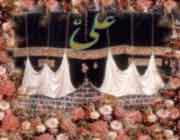
"Certainly your Master (Wali) is Allah and His
Prophet and those who believe, those who establish prayer and give charity while they bow (in prayer)." (Holy Qur’an 5:55)
It is an undisputed fact that the above verse of the Holy Book was revealed when Ali ibn Abi Talib (AS), while in prayer, in the state of "ruku`" (genuflection) with face bowed down towards the Kaba, gave his ring in
charity to a beggar who happened to raise his call for alms at the Masjid an-Nabi (Prophet’s Mosque) in Medina. (Recorded by such prominent Sunni scholars as Wahedi in Asbab-al-Nazul (Reasons of Revelation) and Abu Ishaq Tha`labi in Tafseer al-Kabir).
This verse is one of the many in the Holy Qur’an indicating in clear words the issue of divinely-designated successorship to the Seal of Prophets (SAWA).A successor who should be worthy of donning the mantle of Muhammad (SAWA) and who should stand firm and steadfast as the sacred Kaba itself, when schism and worldly greed sway the minds of Muslims.
"Most surely the first House appointed for mankind is the one at Bekka (Mecca), blessed and a guidance for nations." (Holy Qur’an3:96)
And most surely, the only person ever born in that blessed House, was chosen by the Almighty as a Guide and a Discerner between truth and falsehood for the Umma after the Prophet.
"O Prophet, surely, you are a warner and for every people there is a guide" (Holy Qur’an13:7)
Tha`labi writes in his Tafseer on the authority of Abdullah ibn Abbas that when this verse was revealed, the Prophet said that through Ali (AS), Muslims will be guided.
The Kaba is the symbol of Islamic unity. Muslims around the world daily turn their faces in unison towards this supreme edifice of monotheism. Imam Ali’s role for the Umma is in exact likeness to the site of his birth. To follow his straight course is Islamic solidarity and to leave his path is outright discord.
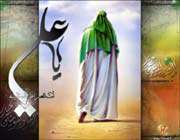
"Surely, this is my straight path, so follow it and do not follow other ways or else you will diverge from His ways." (Holy Qur’an 6:153)
The Almighty had arranged that Muhammad (SAWA), the most perfect man ever created, should have a worthy successor, free of the pollution of polytheist Arabia.
The glorious event occurred on Friday the
13th of Rajab in the year 30 `Aam-al-Feel (600 CE). Abu Talib’s virtuous wife, Fatima bint-i Asad, who was full nine months pregnant, clung to the walls of the Kaba imploring the Almighty to ease her burden for the sake of her great ancestor Prophet Abraham (AS). In answer to her prayers, the walls of the sacred House suddenly parted, and when the lady stepped inside they were miraculously sealed up. The Quraysh did all they could do to bring her out, but the locks and the walls of the Kaba remained fast.
Three days later she came out holding in her arms a radiant baby boy. Among those gathered anxiously around the Kaba was Muhammad (SAWA) who stepped forward and took the infant in his arms. A smile lit up the face of the baby Ali (AS) as his eyes met those of his first cousin.
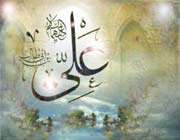
"I and Ali are (created) from the same light" (Holy Prophet)
When Ali (AS) was ten years old, the Prophet received his first revelation and was commanded by the Almighty to publicly proclaim his mission. "I bear witness that there is no god but Allah” said the Prophet. Before the dumbstruck ignorant minds could say anything, the young Ali (AS) rose and gave testimony of his cousin’s divine mission: "I bear witness that Muhammad is the Messenger of Allah." The Prophet called Ali (AS) his vizier and Khalifa (successor)
What could be written of a person, the praise of whom will exhaust ink and paper?
Born in the House of God, and martyred while in communion with his Creator in the Great Mosque of Kufa, with his face turned towards that very site of his birth (Ka`ba), every single moment of Imam Ali’s 63 years in this mortal world was dedicated to and spent in the service of Islam.
As a boy, he stood beside his mentor, chasing away the kids who used to throw stones at the Prophet. He endured the three-year siege of the Bani Hashim clan by the infidels of Mecca in the Gorge of Abu Talib. When plots were hatched to extinguish the light of Prophethood, the brave Ali (AS), volunteered to sleep on his cousin’s bed, so that the latter could migrate to Medina undetected. The reward for his self-sacrifice to which Islam will remain ever-indebted, came in the form of the following verse:
"Among men, is he, who sells his soul for the pleasure of Allah" (Holy Qur’an 2:20)
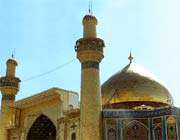
It would be repetitive to recount the valor of Ali (AS) in repelling the retarded infidels, who tried to attack the first-ever Islamic state in Medina. The Lion of God, as he came to be known, Ali (AS) and his flashing blade Dhul-Faqar, won almost single-handedly, the armed encounters that the ignorant of Arabia had imposed upon the Prophet. The fields of Badr, Ohud, Khaybar, Hunayn and several others, still echo with the valor and magnanimity of ImamAli (AS).
Here I would like to focus on one of his many selfless acts. It happened that during the Battle of the Trench (Khandaq), when during a single combat he had pinned down his giant adversary, `Amr ibn `Abdu-Wadd to the ground, the infidel spat on his face. The God-fearing Ali (AS) at once stepped aside in order not to let his personal feelings interfere with the course of the holy Jihad. The fearsome opponent recovered his poise and renewed the combat. This time, the Commander of the Faithful whose every act was the worship of Allah, made short work of Amr. Before the battle he had offered favorable terms which the infidel had rejected out of vanity.
Valiant in battle, he was magnanimous in victory to his fallen foes, and gave strict orders not to humiliate prisoners or harass and plunder women and children. After the Battle of Jamal (Camel), he ordered his troops to give a decent burial to his slain enemies. At Siffin, having broken the enemy’s hold on the River Euphrates, Ali (AS) allowed them access to the very waters which they had blocked to him.
His formal nomination as successor to the Prophet (SAWA) at
Ghadeer-e Khum near Mecca after the farewell pilgrimage perfected Islam:
"This day have I perfected for you your religion
and finalized My blessings upon you, and pleased to bestow upon you Islam as your religion." (Holy Qur’an 5: ).
Ali (AS) was a perfect husband for his loving wife Fatima (SA), and used to do all outside work for the house. Hisdiet was meager and consisted of dried barley bread. For days he used to keep non-obligatory fasts solely forthe pleasure of Allah, spending whatever he had on the poor, the orphans and the disabled. Often Ali (AS)used to spend the whole night in prayer, with his frame trembling in the presence of His Lord.
His famous supplication
Du'a Kumayl which is recited regularly by the faithful to this day, is an eloquent description of the Majesty and Mercy of God. It has been translated into almost all major world languages and the following two paragraphs, which are a random selection, should be enough for inspiring readers with faith.
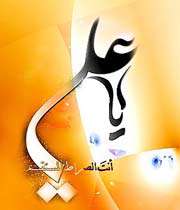
"My Liege, my God, my Master, it is not in me to believe that Thou wilt impose the Fire on the faces of those that have bowed in adoration of Thy Greatness; Or the tongues that have testified to Thy (indivisible) Unity and thanked thee with praise; Or the hearts that have acknowledged Thy Divinity with conviction; Or the minds that are so saturated with Thy knowledge as to humble themselves in Thy Presence; Or on the limbs that have striven towards Thy service and obedience, endeavoring confidently to seek Thy forgiveness. This can never be expected from Thee, nor does Thy Grace permit such an assumption, O Generous One.
"O Lord! Thou knows that I am too weak to withstand, even a small portion of this world’s trial, or their consequences, or the sorrow that befalleth its inhabitants, though these trials are transient, evanescent and short-lived. How then will I withstand the trial of the Hereafter, with its tremendous sufferings and its prolonged, perpetual misery, which shall never be alleviated for its inmates? ...
"O Thou Whose name is a panacea, Whose remembrance is a sure remedy, and Whose obedience is a source of independence! Have mercy on one whose capital asset is hope and whose instrument is lamentation. O Thou that gives happiness and blessings and wardest off misfortunes..."
It was Ali (AS) to whom the Prophet Muhammad (SAWA) had entrusted the performing of his last rites. The bonds between the Prophet and his rightful legatee were not of mere kinship, but divinely-cemented.
In 9 AH, upon revelation of the opening verses of Sura Bara’a, the Prophet sent one of his Companions, Abu Bakr, to Mecca to proclaim the divine words at the holy Kaba. But no sooner had that aged companion departed, the archangel Gabriel descended, telling the Prophet that it was God’s Will that either he should proceed in person or deputize a member of his family closest to him. The Prophet asked his vicegerent to proceed with speed and take over the charge from Abu Bakr, which the faithful Ali (AS) dutifully performed. (Recorded by Ahmad ibn Hanbal in Musnad and by Tabari in his monumental work on history).
"Ali is from me and I am from Ali." (the Prophet)
Imam Ali’s four-and-a-half year model rule of justice is beyond the scope of this brief article. Suffice it to say, it was cut short by the forces of discord in the blessed month of Ramadhan in 40 AH while he was engrossed in the Morning Prayer in the Mosque of Kufa.
Ali (AS) was the Kaba as the Prophet had remarked. If his forehead bore the mark of lengthy prostrations to the One and Only God, the Qibla of Islam in turn, continues to proudly display on its wall the birthmark of Imam Ali(AS) -the section of the Kaba which had miraculously parted for his mother-which none have been able to erase.
"Ali is with righteousness and righteousness is with Ali" (the Prophet)
Monday 3 December 2012
Ask me Ask me! I know the ways of the skies than the ways of the on the earth! Ask me ask me! Before you miss me!
That man is, can and only be Imam Ali (a.s), the one who gives Zakat in the form of Rukoo! 2 Ibada'ts at the same time! - Ayatullah Khomaini
There are several comments our Ulemas have posted on Imam Ali (as), but this one comment, which Imam Hassan (as) gave in front of Muaw'iah in his court is enough to be sublimed as the purest note!
O Muaw'iah, if I stand here, and start reading the Tafsir of my Father, By Allah, the Doomsday's sun will turn down, and my tafsir of Imam Ali (a.s) wont finish!
This Tumbler blog, explains beautifully the character of our Imam (as) with his justice!
 Further books on Imam Ali (as) over here
Further books on Imam Ali (as) over here- Imam Ali (as)'s Ziaraats in full insight here (coming soon)
The only person to be born in the Kaaba
The 13th of the month of Rajab, twenty-three years before the migration of the Prophet Mohammad (pbuh) a child was born in the family of Abu Talib, the light of whom kindled the whole World. Kunaab Mecci narrates about his birth: "We and Abbas (Ibne Abdul Mutalib) were sitting together when suddenly we saw Fatima bint-e-Asad moving towards the Kaba in the condition having delivery pain and saying "Oh God I have faith in you and the Prophet (i.e., Abraham) who by your command laid the foundation of this house. O God! I swear you by the same Prophet Mohammad (pbuh) and swear you by the child in my womb make this birth comfortable and easy for me."
This was the time when all of us saw with our own eyes that the wall of Kaba broke apart and Fatima bint-e-Asad entered into the Kaba. Then the wall again united.
We ran terrified and trembling to our houses to send our women into the Kaba for the help and assistance of Fatima bint-e-Asad. We did our best but the door did not open. This event surprised all the people of Meccah.
The women of Macca were anxiously counting moments to meet Fatima bint-e-Asad till the time she came out of the Kaba along with a beautiful baby, saying, "God has chosen me from among the ladies of Macca and He made me His guest in His house and gave me meals and fruits of the heaven to eat.
The ladies who were surrounding her in the form of a circle and escorting her to her home asked her, "What name have you given to this child?"Fatima bint-e-Asad said: "When I was in the Kaba, I heard a hidden voice call," Name this child "ALI".
Yes! We are talking about Imam Ali ibn Abu Talib (AS) the pious man whose childhood and infancy period lasted in such a pure and chaste way that he himself stated in Nahjul Balagha, "The Prophet Mohammad (pbuh) used to pick me in his lap and embrace me and chew the food and put it into my mouth."
Sunni Reference Shah Waliyullah in his book 'Izaalatul Khifa' mentions that this distinction of Imam Ali (as) is that no one was born before or will be born after him in the Ka'aba.
Short Biography
Introduction:
All the human beings experience ups and downs and face different problems in life The individuals , usually get weak and unable when facing a problem and try with the aid and guide of the experts to save themselves from the trouble;And by finding the "examples" in any field , and then following them , perform their duties in the best way as to solve their problems and relieve their pains. One of these examples is the honoured prophet (A.S) whom the holy koran has described (indentified) as such.
Other than the messenger of God (A.S) , if we look for another example and replacement for his holiness we would find a great example as the (leader of the) pious his holiness Imam Ali (A.S). Morals and behaviour, to go through his holiness ups and downs, and amazementsof life .
Manner of birth:
His holiness Ali (A.S) is the first child in the family of Bani-Hashem whose both parents are children of Hashem. His father Abu-Taleb is the son of Abdul-Mottaleb the son of Hashem bin Abd-Manaf and his mother is fatemah the daughter of Asad who is the son of Hashem bin abd-manaf. The Hashemi family in the tribe of Qoraish is well-known (famous) for its moral virtues and high (supreme) humanistic characteristics among the Arab tribes.
Magnanimity, generosity, courage and so many other virtues are characteristics of Bani-hashem.Moreover, each of these virtues at its highest degree exist in his holiness Ali’s (A.S) existence. Fatemah, the daughter of Asad went to the holy mosque when labour pain and came close to the wall of Kaba and said : O God, I have firm faith in you,the prophets and the books sent by you and also the speech of my grand father the builder of this house . O God, in consideration to the respect of the one who built this house and for the sake of the child in my womb make the birth of this child easy.
An instant later, in front of the eyes of Abbass bin Abdul-Mottaleb and Yazeed bin Taaf the south east wall of Kaba cracked and Fatemah entered the Kaba; the wall closed again.
She was the guest of God for three days in the holiest place in the universe and their she gave birth to her child. Three days after the thirteenth of Rajab, thirty years passed the year of the Elephant;Fatemah , the daughter of Asad, came out of the same cleavage in wall which opened again and said: I heared a message from the unsean to call him Ali.
Period of childhood:
His holiness Ali stayed with his parents. Since it was God"s well for him to gain more perfection, therefore, the honoured prophet from the beginning of his birth took care of his indirect education.
Untill an unsual famine occurred in Mecca.Abu-Taleb the uncle of the prophet having many children faced a heavy living expense. The honoured prophet (A.S) with the consultation of his uncle Abbass,came to agreement that each one of them take one of the children of Abu-Taleb with him as to make a relief for Abu-Taleb. Therefore Abbass took Jaffar and the prophet (A.S) took Ali (A.S) to his house.
In this way his holiness Ali (A.S) was completely besides the prophet (A.S).Ali (A.S) was always accompanying the prophet (A.S) even when the prophet (A.S)would leave to town and go to the mountain and desert.
Appointment of the prophet (A.S) and his holiness Ali (A.S):
There is no doubt that acceleration in good deeds is a kind of privilege virtue and (the exalted) God in several verses asked his salves to perform them and called them to compete with each other. One of the virtues of his holiness Ali (A.S) is that he is the first one to believe in the prophet (A.S).Ibn Abeel Al-Hadeed says related to this : Know that among the great , big and scholastic theologians of the Mutazilites there is no dispute that Ali bin Abee-Taleb is the first person to believe in Islam; and to support the messenger of God.
His holiness Ali (A.S) the first supporter to the honoured prophet (A.S) :
After the revelation of God , the selection of his holiness the prophet Mohammad (A.S) for prophethood and the three years of secret preaching, finally,the messenger of revelation arrived and the order for public preaching was given.
At this juncture, his holiness Ali (A.S) was the only enforcer of the prophet (A.S) plans in his divine propagation; And was the only companion and sympathetic to his holiness in the invitation arranged to acquainte his relatives to Islam and to call them to the religion of God.In this invitation the prophet (A.S) asked the people present:
"who is among you to help me in this way so to be my brother, successor and representative among you". Only Ali (A.S) answered : "O prophet of God, I will support you in this way".The prophet (A.S) after three times repeating the question and hearing the same answer said : O my relatives ; Know that Ali (A.S) is my brother , successor and Caliph after me among you.
Of the other glories of his holiness Ali (A.S) is his perfect courage in sleeping in the prophet’s (A.S) bed , therefore, nullifing the plot of the idol-worshipers to kill the prophet; And , farthermore, prepared the ground for the prophet’s (A.S) migration. After the migration of his holiness Ali (A.S) and the prophet (A.S) to Madina, we explain two examples of the virtues of Ali (A.S):1- Self-sacrifice and endangering in the field of struggle His presence in 26 battles of the 27 battles of the prophet (A.S) and participation in different expeditions are of the glories and virtues of his holiness.2- Registering (keeping) and writing the revelation [Quran]: Writing the revelation, organizing (arranging) many of the historical and political documents and writing propagational and invitation letters, both in Mecca and Madina, And for this reason he is considered one of the writers of the revelation and memorizers of the Quran.
It was in this period that the prophet (A.S) issued the decree of Moslems brotherhood, concluded the contract of brotherhood with his holiness Ali (A.S) and said to his holiness Ali (A.S): "You are my brother in this world and in the here after, swearing by the God who has appointed me with the truth. I choose you as my brother, a brotherhood that is to the extent of both worlds".
His holiness Ali (A.S) the son-in-law of the honoured prophet (A.S):Omar and Abu-Bakr with the consulation with Saad Maath the head of the tribe of Aws realized (found out) that there is no body other than Ali (A.S) competent (appropriate) for Zahra (A.S) . therefore, when Ali (A.S) was among the trees of the garden of one of the Ansar busy watering. They suggested this subject to him and he said : "I love the daughter of the prophet (A.S). "And went towards the house of the prophet (A.S) . When he reached to the honoured prophet (A.S) the glory of the presence of the prophet (A.S) prevented him from speaking until the honoured prophet (A.S) asked for the reason for his return;Then his holiness Ali (A.S) depending on his virtues , piety and bright past in Islam said: "do You deem it wise for me to marry Fatemah". After the acceptance of Zahra (A.S) his holiness Ali (A.S) won becoming the son-in-law of the honoured prophet.
The pond of Khom :
In the last Year of his holiness the prophet’s (A.S) life , after finishing the rituals of piligrammage and when returning in a place called the Khom pond close to Johfa , he Ordered to stop, because the revelation commanded the prophet (A.S) to complete his message.After the noon prayer the prophet went up the (minbar) pulpit of the camels saddles and said: "O people, it is soon that I answer the call of God and go from among you. what do you think about me" .People said: "we witness that you have propagated the religion of God".Prophet (A.S) said:" Don’t you witness that there is no God but the one God and Mohammad is his slave and messenger".People said:"Yes, we witness".Then the prophet (A.S) raised the hand of his holiness Ali (A.S) and said:"O People! among the believers who is more worthy than them selves.People said : "God and his prophet know better" .
Then the prophet said:" O People who ever I am his master and leader; Ali is his master and leader.And repeated this sentence three times.then the people congratulated this selection to his holiness Ali (A.S) and swore allegience to him
His holiness ali (A.S) after the death of the honoured prophet (A.S) :
After the death of the honoured prophet (A.S) because of special conditions that arised, his holiness Ali (A.S) with draw from the scene of the society and choose silence; He neither participated in any struggle nor spoke officially in the society . He put the sword in the sheath and engaged with individual duties and educating the individuals.
Activities of Imam Ali (A.S) in this period were/briefly as follows :
1- Worshiping God , according to the level of his holiness Ali (A.S).
2-Interpretation of the koran, solving religious problems and decreeing the rule of incidents that didn"t have a resemblance along the 23 Years of the prophet"s life.
3-Answering to questions of scholars from other religions and other towns.
4- Expressing the rule for many of the new events which didn"t occur previously in Islam.
5-Solving the problems when the caliphate system faced dead ends in political matters and some other problems.
6-Educating and raising a group who have pure con science and prepared soal for spiritual journey.
7-Work and strife to secure the life of many of the poor and disabled to the extent that he would establish gardends and extract aqueducts and then would give them as endowments in the way of God.
Period of the caliphate of his holiness Ali (A.S) in the time of his holiness caliphate many wars occurred as Seffin, Jamal and Nahrawan which had specific consequences following.
After the war of Nahrawan and the suppression of the Kharijites. Some of the Kharijities among whom was Abdul-Rahman bin Moljam Moradi and Barak bin Abdulla Tameemi and Amr bin Bakr-tameemi in one of the nights got together and considered the ciruims tances of that time the blood-sheds and civil wars and remembered Nahrawan and their deads and finally reached to this conclusion that the reason for this blood-shed and brothers killing are his holiness Ali (A.S), Moawiah and Amr bin Aass and if these three one removed the moslems will know there duties therefore, they concluded the treaty that each one of them he responsible for killing one of the three.
Ibn Moljam undertook killing Imam Ali (A.S) and on the ninetheenth night of the month of Ramadan accompanied with some stayed in the mosque of Koofa. That night his holiness Ali (A.S) was a guest of his doughter’s and was aware of the morning accident. When he mentioned this subject to his daughter. Om-Kolthoom said: Tomorrow send Joada to the mosque.
His holiness Ali (A.S) said: It is not possible to escape the Godly decree, then he fastened his belt and while humming these two verses he went to the mosque.Fasten your back firmly for death Because death will meet you and when death comes to you don’t fear or scream.
While his holiness Ali (A.S) was in prostation, Ibn Moljam hit him with the sword on his forehead and blood from his holiness head streamed in the altar and blood dyed his honoured beard. In this condition his holiness said: I swear by the God of Kaba that I won. Then reate verse 55 from soora Taha:From it we created you and into it we shall send you back and from it we raise you a second time.
This holiness Ali was at his last moment of his life still thinking of the welfare and happiness of the peoples adviced his chidlren relatives and all the moslems saying : Idvice you of piety and to organize your deeds and always think of causing reconciliation among the moslems.Dont forget the orphans, regard the rights of the neighbours.Make Quran the practical programme for yourself.Respect (honour) praying because it is the pillar of your religion.
His holiness Ali (A.S) attained martyrdom on the 21 st of the month of Ramadan and was burried in the honoured Najaf . His shrine became the tryst for the lovers of the truth and reality.
ــــــــــــــــــــــــــــــــــــــــــــــــــــــــــــــــــــــــــــــ
sources:
01- Soora Ahzab, verse: 21.
02- Foroogh welayat, p.35 (kashf Al-Ghoma v.1 , p.9)
03- Aftab welayat, p.19 (Al-Kharaej and Al-Jaraeh v.1 , p.171)
04- Aftab welayat, p.19 (Behar Al-anwar v.35 , p.18)
05- Aftab welayat, p.37 (seerah bin Hesham v.1 , p.236)
06- Aftab welayat, p.38.
07- Aftab welayat, p.131 (Soora Bakara , verse:148)
08- Aftab welayat, p.86 (Mostadrak Hakem v.3 , p.14 Isteeaab , v.3 , p.35)
09- Aftab welayat, p.141 (Soora Maeda , verse:47)
10- Aftab welayat, p.697.
11- Aftab welayat, p.697 (Behar Al-Anwar quoting from Amali , v.9 , p.650)
12- Aftab welayat, p.697.
"They ask you what they should spend, Say: what-ever of wealth you spend, is for the parents, relatives, orphans, the needy and the traveler, and whatever good you do, Allah is surely omniscient of it." (2:215)
A man once asked the Messenger of Allah (SAW):"What people does Allah love most?"
He answered:"They are the most useful ones to the people." (Wasa'il ash – Shiah, P.6)
It is also narrated from Prophet Muhammad (SAW) that he said:
"All mankind belong to Allah, therefore the most favored by Allah is the one who is good to his or her own family." (Ibid.)
It is also narrated that; "The doer of good is better than good itself and the evil-doer is worse than evil itself." (Tuhaf al – Uqul an Aali al – Rasool, P. 40)
It is also narrated that Messenger of Allah (SAW) said:
"whoever guides others towards good is like the one who does it himself." (Ibid.)
It is also narrated that the Prophet (SAW) said: Don't do anything of good so as to be seen by people, nor give it up because of shyness." (Ibid., P. 41)
It is narrated from Imam Ali (AS) that he said: "Speak much of good in order to be known by it and do good to be identified with its followers." (Mishkat al – Anwar, P. 144, 2nd edition)
Ideologies, laws, systems, ideas and theories created by the human beings in the fields of ethics, politics, sociology, economic, psychology and the arts, etc., all express their authors' ideological, psychological and social inclinations.
It is also obvious that the nature of human creation is defective, and incomplete. People generally differ among themselves in their psychological, ideological, ethical and social background and education.
Therefore, some ideologies and theories reflect the twisted and complex ethics of their authors and originators who produced these ideals either under the influence of their environment or by inheritance and education.
Thus, we see some of these ideologies bear the spirit of spite and revenge; while others are characterized by chaos and disorder. Still others reflect the greedy and selfish nature of their originators. In every aspect they mirror the nature, personality, disposition and psycho – logical state of their authors.
The main difference between Islam and other ideologies is its being the Message of Allah to mankind and a call to reform humanity towards following the Divine Path.
Therefore, Islam through its laws and principles, expresses the perfection of the Great Creator, Who is the source of good, knowledge, mercy, love, and beauty in this world. His characteristics are made clear by the call of the Prophets and messengers in the spirit of goodness, love and peace.
Thus among the foundations on which the moral and social system of Islam is built, is its call to do good, to make the human being a source of power, and reformation in this world. Islam frees him from the wicked tendencies which cause him to abstain from doing good to people and society.
A major social problem for the human being is created by his selfishness, desiring good only for himself and sometimes forbidding that good be rendered to others.
This wicked tendency which the Qur'an collectively describes as"Shu'h" (Greediness) is condemned. The Qur'an also condemns whoever is characterized by it, considering him to be among the criminals and the aggressors who stand against human principles and life itself, and promises him intense punishment in the hereafter, as it views "Shu'h" as the source of all tribulations, the root cause of poverty and aggression, hatred, spite, covetousness, deprivation and sufferings in this present life.
In the Qur'an, the Almighty Allah says:
"The two of you do cast into hell every ungrateful, rebellious one. Forbidder of good, exceeder of limits, doubter." (50:24 – 25)
Quran also states: "…
and reconciliation is better, and souls are prone to avarice. And if you do good and be God-fearing, then surely Allah is Cognizant of what you do." "4: 128)
For the same reason, Islam considers prosperity and success as a protection against such harmful moral sickness.
In the Qur,an, the almighty Allah says;
"… and whoever is saved from the greediness of his soul, these it is that are the successful." (64:16)
When the Messenger of Allah (SAW) talks about good and its doers in the society, he wants to teach Muslims and Islamic society that an Islamic society is a cooperative one. The social service performed by a scientist, farmer, doctor, teacher, thinker, social reformer, and one who participates in charitable projects, or helps the poor and the needy; all these works are considered good deeds to which generous people in society contribute.
Therefore, those who are doing good and are inspired in their works by knowledge of Allah and who like to do good seeking His pleasure, these are the best people because of their social usefulness.
The Holy Prophet (SAW) has guided our social preferences through his example, that is, serving the society and encouraging social advancement while seeking Allah's Pleasure.
The Islamic view which sees society as one family and creation (the human being, animal, plant) as belonging to Allah and depends on Him. It aims to shape this world with all its individuals and elements into a unity and completeness, to deepen the cultured comprehension and consciousness of man and to confirm his role in serving to develop the world.
Imam Ali (as)'s character in the light of the Quran
To prove the caliphate of Ali ibn Abi Talib, Shiites have had recourse to Quran verses, including the following:
"Your master [wali] can be only Allah; and His messenger and the those who believe, who establish worship and pay the poor due, and bow down (in prayer) [or, and this reading is accepted by "Allamah Tabataba’i: "... pay the poor due while bowing down (in prayer)"]" (Quran, V, 55). Shi’ite and Sunni commentators alike agree that this verse was revealed concerning Ali ibn Abi Talib, and many Shi’ite and Sunni traditions exist supporting this view.
Abu Dharr Ghafafi has said: “One day we prayed the noon prayer with the Prophet (SW). A person in need asked people to help him, but no one gave him anything. The person raised his hands to the sky saying, "Oh God! Bear witness that in the mosque of the Prophet (SW) that no one gave me anything." Ali ibn Abi Talib was in the bowing position of the prayer. He pointed with his finger outwards towards the person, who then took his ring and left. The Prophet (SW) , who was observing the scene raised his head toward heaven and said:
"Oh God! My brother Moses said to Thee, "Expand my breast and make easy my tasks and make my tongue eloquent so that they will comprehend my words, and make my brother, Harun, my help and vizier" [Quran, XX, 25-30]. Oh God! I am also Thy prophet; expand my breast and make easy my tasks make Ali my vizier and helper."" Abu Dharr says, "The words of the Prophet had not as yet finished when the verse [cited above] was revealed."
Another verse which the Shiites considers as proof of the caliphate of Ali is this: " This day those who disbelieve in despair of (ever harming) your religion; so fear them not, fears me! This day have I perfected your religion for you and completed My favor unto you, and have chosen for you as religion AL-ISLAM" (Quran, V,3). The obvious meaning of this verse is that before that particular day the infidels had hopes that a day would come when Islam would die out, but God through the actualization of a particular event made them lose forever the hope that Islam would be destroyed.
This very event is the cause of the strength and perfection of Islam and of necessity could be a minor occasion such as the proclaim of one of the injunctions of religion. Rather, it was a matter of such importance that the continuation of Islam depended upon it. This verse seems to be related to another verse which comes toward the end of the same chapter: "O Messenger! Make known that which hath been revealed unto thee from thy Lord, for if thou do it not, thou will not have conveyed His message, Allah will protect thee from mankind." (Quran, V,67).
This verse indicates that God commanded a mission of great concern and importance to the Prophet (SW) that if not accomplished would endanger the basis of Islam and prophecy.
But, the matter was so important that the Prophet (SW) feared opposition and interference and in awaiting suitable circumstances delayed it - until there came a definite and urgent order from God to execute this command without delay and not to fear anyone. This matter also was not just a particular regligious injunction in the ordinary sense, for to preach one or several religious injuncations is not so vital, that if a single one of them was not preached it would cause the destruction of Islam. The Prophet (SW) of Islam did not fear anyone in preaching the injunc- tions and laws of religion. These indications and witnesses add weight to the Shi’ite tradi- tions which asset that these verses were revealed at Ghadir Khoum and concern the spiritual investiture (walayat) of Ali ibn Abi Talib. Moreover, many Shiites and Sunnis commentators have confirmed this point.
Abu Said Khudari says: "The Prophet (SW) in Ghadir Khumm invited people toward Ali and took his arm and lifted it so high that the white spot on the armpit of the Prophet (SW) could be seen. Then this verse was revealed:
"This day have I perfected your religion for you and completed My favor unto you, and have chosen for you as religion Al-ISLAM."
Then the Prophet (SW) said, "God is great (Allahu akbar) that religion has become perfected and that God’s bounty has been completed, His satisfaction attained and the walayat of Ali achieved." Then he added, "For whomever I am the authority and guide Ali is also his guide and authority. Oh God! Be friendly with the friends of Ali and the enemy of his enemies. Whoever helps, help him, and whoever leaves him, leave him."
In a summary, we can say that the enemies of Islam who did everything possible to destroy it, when they lost all hope of achieving this end, were left with only one hope. They though that since the protector of Islam was the Prophet (SW), after his death Islam would be left without a guide and leader; and thus, definitely perish. But, at Ghadir Khumm their hopes were brought to end as the Prophet (SW) presented Ali as the guide and leader of Islam to the people. After Ali, this heavy and necessary duty of guide and leader was left upon the shoulders of his family.
A Unique leader in the History of Mankind
The history of mankind has witnessed many leaders over the ages. Many of these leaders achieved leadership through might or inheritance and some were chosen as leaders because of certain outstanding qualities that they possessed. Among the latter group there have also emerged some leaders whose works and contribution to humanity cannot be limited to any particular time or place; and their life-styles, their works and the sayings of such heroes continue to inspire and motivate people, generation after generation.
Amir al-Muminin, Ali ibn Abu Talib is a unique leader who stands out among all other leaders. Besides Shi"as who believe in his Imamate and Vilayat, many non-Muslims have praised his personality and unique qualities and made attempts to highlight certain aspects of the personality of this everlasting leader of ages and have written hundreds of books and research papers about him.
Imam Ali (A.S.) was brought up by the Messenger of Allah (PBUH) and under his guardianship and was elevated to such a stage that it would be no exaggeration to say that he is Islam’s gift to the world of humanity.
Imam Ali’s (A.S.) life was not the repetition of other people"s lives, rather his life shed light on certain aspects of human life which had so far been undiscovered. He was born in Allah"s House (Ka"ba) and was martyred in Allah"s house (mosque) and his main principle throughout his life was winning Allah"s Satisfaction. Hence, one would not be wrong to say that any research on Imam Ali"s (A.S.) life and personality would highlight an aspect of his life that could be taken up as a role model for the people who seek truth; Muslim or otherwise.
Imam Ali (A.S.) from Birth to the Dawn of Islam:
Ali (A.S.) was the son of Abu Talib ibn-e Mutallib and Fatima bint Asad ibn-e Hashim. He was born on 13th Rajab, 30 years after Amal-Fil. His life began in the Holy Kaba, 1 which became the Qiblah of Muslims and ended in the Mosque of Kufa (Iraq).
It was Allah"s Will that from the early days of his life, the Prophet of Allah be brought up on his lap. Mecca and Quraysh were struck by famine. Muhammad (SAW) met his other paternal uncle Abbas who was a wealthy man and made a suggestion to him to support Abu Talib (S.A.) by taking up the guardianship of some of his children. Abbas welcomed the suggestion and they met Abu Talib (S.A.) and informed him of their intention. Abu Talib (S.A.) said: "Leave Aqil for me..." Muhammad (PBUH) chose Ali (A.S.), and Abbas took Ja’far. Later on, the Messenger of Allah (PBUH) is known to have said: "I chose the one Allah had chosen for me."
Some writers are of the opinion that by accepting Imam Ali’s (A.S.) guardianship, the Prophet (PBUH) meant to compensate for the favors he had received from Abu Talib and Fatima (Ali"s parents), who looked after him like their own children during his childhood. However, from what the Prophet (PBUH) had said and from Ali’s (A.S.) behavior - it is quite clear that it was Allah"s Will that Ali (A.S.) should grow up with the Prophet (PBUH) and under his guardianship.
The young Ali’s (A.S.) personality was being shaped by Muhammad (PBUH), when the latter declared his prophethood. According to most historians, Ali (A.S.) was the first among the men to embrace Islam. Ali (A.S.) was the only disciple of the Prophet (PBUH) who had never bowed before or worshipped idols.
He had no other ideal but to seek Allah and His prophet’s (PBUH) satisfaction, and his sincerity, steadfastness, sacrifice, and bravery in supporting `Tawhid" were some of his outstanding qualities no one can ever deny.
From the Dawn of Islam to the prophet’s (PBUH) Demise:
The Dawn of Islam in Arabia, which was stricken with ignorance (Jahiliyah) and superstitions, not only changed the course of history in that land but also influenced other nations and peoples of the world. Savage customs that were considered as values in those times - communal rivalries, burying baby-girls alive, etc., were rendered as disgraceful and inhuman by the new religion of Islam. This change in the social and individual beliefs and customs was the fruit of the years of struggle and endeavor by the Prophet (PBUH) and his close and sincere companions among which Ali (A.S.) played the greatest role. His contribution to the spread of Islam was exemplary and he was the greatest gift of Islam and its Prophet (PBUH) to humanity. A voluminous book is required to write about Imam Ali’s (A.S.) contribution towards the establishment of Islam but in this discussion, we shall confine ourselves to reviewing only a few of them.
1. Important Incidents that took place in Mecca:
a) Yom al-Anzar
After the verse "... and warn your nearest relations ...," was revealed, the Prophet (PBUH) was commissioned by Allah to make public, the invitation to accept Islam. Thus, he asked Ali (A.S.) to prepare a meal and invited his close relatives over. After the meal, he publicly announced his Prophethood and asked: "Which one of you will support me in my mission to be my brother, successor and caliph?" Only Ali (A.S.) stood up to swear allegiance, and the Prophet (PBUH) introduced him as his successor and caliph.
b) Laylatul-Mabit
Despite all the efforts by Quraysh to prevent Islam from spreading, the people of "Yathreb" embraced Islam and swore allegiance to protect it with their swords. This news outraged the Quraysh who in an emergency meeting decided to assassinate the Prophet (S.A.W.) collectively. On uncovering this devious plot, the Prophet (PBUH) requested Ali (A.S.) to wear his mantle and to sleep in his place 7, in order to foil the evil plans of the enemies of Islam and to facilitate his `Hejira" (Migration) from Mecca to Medina. It was after this incident that reflected the deep devotion, courage and commitment of Imam Ali (A.S.) towards the Messenger of Allah (PBUH) and his divine mission, that Jibrail (A.S.) conveyed the news:
"O" son of Abu Talib, there is none like you; Allah boasts to the angels of the seven heavens about you!"
2- Important Events in Medina:
The prophet’s (PBUH) migration to Medina is a turning point in the history of Islam after which it went through a lot of ups and downs. Ali (A.S.) had an outstanding role in the events that followed the prophet’s (PBUH) migration, a few of which are mentioned hereunder:
a) Ali’s (A.S.) Marriage with Fatima (S.A.)
After prophet’s(PBUH) migration, Imam Ali (A.S.) was given the responsibility of bringing Hazrat Fatima (S.A.), the beloved and devoted daughter of the Prophet (S.A.W.), to Medina. A few months later Ali (A.S.) married Fatima (S.A.). Ya`qubi, the Muslim historian writes:
"A group of `Muhajers" (those who had migrated from Mecca to Medina) had proposed for Fatima’s (S.A.) hand in marriage. On hearing about her marriage with Ali (A.S.), some of them raised objections. In reply to their objections, the Prophet of Allah (PBUH) said: “I did not marry Fatima to Ali, rather it was Allah Who married her to Ali.” 9 Interestingly, the prophet’s (PBUH) lineage has been through Fatima (S.A.) and Ali (A.S.).
b) Brotherhood with the Prophet (PBUH)
To bring the Muhajers and Ansars closer to each other, the Prophet (PBUH) decreed that the Muhajers and Ansars should make brotherhood pacts among themselves; in pairs. However, he chose Imam Ali (A.S.) as his brother and said to him: "You are my brother, successor and inheritor and I inherit from you."
c) The prophet’s (PBUH) Description of the Manner of Ali"s Martyrdom
During the Battle of Zat ol-Ashira, that took place in the second year of Hejira, the Prophet (PBUH) sent Ali (A.S.) and Ammar on a mission. After some time the Prophet (PBUH) joined them and found them asleep. After waking them up, he said: "Should I inform you about the two most wretched men of all people?" On receiving their positive response, he then added: `The man who slew Saleh"s camel and the man who will hit you (Ali) on the head and will make your blood flow to your beard."
d) Ali"s Unique Bravery in the Battles
Except for the Battle of Tabuk in which Ali (A.S.) remained in Medina on the prophet’s (PBUH) order, he had participated actively in all the battles and played a decisive role in all of them. Although it is not possible to discuss Ali"s (A.S.) role in all these battles, we shall attempt to highlight a few of them.
i)Ali"s role in the battle of Badr cannot be comparable to any of the other companions. As written by some historians, he killed 32 enemy soldiers single-handedly.
Interestingly, 33 years later when Ali (A.S.) was forced to accept the caliphate, a group of Quraysh like Sa`id ibn-e Aas and Walid ibn-e Aqrabeh, who later on participated in the battles of Jamal and Siffin against Imam Ali (A.S.), were hesitant to swear allegiance because he had killed their fathers in the Battle of Badr.
ii) Imam Ali (A.S.) was the only companion of the Prophet of Allah (PBUH) who never fled from the battlefield. History has recorded that many of the close companions of the Prophet (S.A.W.) fled during the battles of Uhud, Kheybar and Hunayn.
e) Imam Ali (A.S.) was appointed to communicate `Surat al-Bara"at"
After the revelation of `Surat al-Bara"at", the Prophet (PBUH) appointed one of his companions to communicate the messages to the unbelievers. However, before this companion reached Mecca, the Prophet (PBUH) sent Imam Ali (A.S.) to take the newly-revealed verse from him and to personally communicate it to the unbelievers. On their return to Medina this companion asked the Prophet (PBUH) for the reason of this change of decree, to which the Prophet (PBUH) replied: "It was Allah"s will that it should be communicated by a member of my Household."
f) Ali was a Judge in Yemen during the last few years of the Prophet"s (S.A.W.) Life.
After the prophet’s (PBUH) migration to Medina from Mecca, Islam spread rapidly in the Arabian Peninsula as a result of which Imam Ali (A.S.) was often sent by the Prophet (PBUH) to propagate Islam in different regions. However, what is of great importance is the mission that was not given to any other companion. Towards the end of his life, the Prophet of Allah (PBUH), asked Imam Ali (A.S.) to go to Yemen which was a rather civilized society in those days, to discharge the duties of a judge (qazi). It has been narrated that Imam Ali (A.S.) told the Prophet (S.A.W.): "I am young and do not know about judgment." The Prophet of Allah (S.A.W.) put his hand on the young Ali’s (A.S.) chest and prayed: "O Allah! Guide his heart and make him articulate in judgment." Here Belazari has quoted Imam Ali (A.S.) as saying: "I swear by Allah that I have never been in doubt while passing a judgment between the disputing parties."
After the prophet’s (PBUH) demise, the caliphs and particularly the second caliph frequently asked for Ali"s (A.S.) opinion on various issues and in their judgments.
g) Ghadir-e-Khom
Both the Sunni and Shi"a sources have narrated a number of incidents that highlight the status and position of Imam Ali (A.S.). However, undoubtedly one of the most important incidents is the `Ghadir-e-Khom". On his return from Hajjatul-Vida at a location famous as `Ghadir-e-Khom, the Prophet (PBUH) delivered a very important sermon and while holding and lifting the hand of Imam Ali (A.S.), clearly asked the people gathered there:
"O people! Is it not true that my `Vilayat" over you (believers) is of more importance than your `Vilayat" over yourselves?" To this question, the people answered in the affirmative. Then the Prophet (PBUH) announced: "The one whose Mawla (Master) I am, Ali is his Master. O Allah! Love him who loves Ali, and be the enemy of the enemy of Ali...."
In that gathering at Ghadir-e-Khom, the Prophet (PBUH) also spoke regarding other important matters that stress on the importance of Imamate and Vilayat in the Islamic context. One of his important announcements was as follows:
"O people! I shall soon be departing from your midst. And you will meet me at the Pond of `Kawthar". Then I will ask you about two precious things (Thaqalayn). So be careful as to how you treat these two, after my demise."
Then the people inquired from the Prophet (PBUH) regarding the "two precious things" which he had referred to.
The Prophet (PBUH) explained: "One of them is the Qur’an- one end of which is in Allah’s Hand and the other is in yours. So stick on tightly to it, so that you protect yourself from being misled. And the second one is my Pure Household."
At the end of the prophet’s (PBUH) sermon, many of the people came forward to congratulate Ali (A.S.) and to extend their hands in allegiance to him. While yet others, were confounded with doubt and ambiguity. However, as for reliable Islamic sources, this incident has strong recorded evidence and it has been narrated through many chains of transmission of both Shi"a and Sunni schools of thought.
The Compiler of Nahjul-Balagha's character insight
Bith and Childhood
The life of Sayyid Razi who was born in 359 AH/970 CE in Baghdad and died in the year 406/1015 in his hometown, coincided with the era of the Buyid dynasty. It was the golden age of Arabic literature and among his contemporaries mention could be made of the great poets Al-Mutinabbi and Abual-"Ala"Mu" arri.
Sayyid Razi was born in a prominent household directly descended from the Prophet (pbuh), as is clear from the epithets of "Sayyid" and "Sharif, by which he was referred.
Sayyid Razi"s Father
His father Abu Ahmad Husayn bin Musa was fifth in line of descent from the 7th Imam, Musa al-Kazim (a.s.),
and held the prestigious position of the "Naqib al-Nuqaba"of Iraq,a responsibility which required the managing of affairs of the Sadats (Prophet"s descendants) . He was given the title of "Tahir Awhad Dhu al-Manaqib" and died in 396 and was buried in the shrine of Imam Husayn (A.S.) in Karbala". At his death, Sayyid Razi, who had been acting as his father"s deputy since 381, officially became the Naqib al-Nuqaba" and held the position till his own death in 406/1015.
His father"s genealogy reads: Husayn bin Musa bin Muhammad bin Musa bin Ibrahim Mujab bin Imam Musa al-Kazim ( a.s.).
Sayyid Razi"s Mother
Sayyid Razi"s mother Fatimah also traced her lineage to the Prophet (pbuh) and was the daughter of Husayn bin Abu Muhammad al- Hasan al-Utrush bin "Ali bin Hasan bin "Umar al-Ashraf the son of the 4th Infallible Imam, "Ali ibn al-Husayn Zayn al-"Abidin (a.s.). She was a pious and noble lady, and was held in high esteem by scholars and other notables. At her request, the great scholar Shaykh Mufid compiled the book Ahkam al-Nisa" which contains the fiqhi rules for women. Her family had carved out an independent principality in Tabaristan on the southern coasts of the Caspian Sea. She died in Baghdad in 385 AH.
Islamic Education And Knowledge
There is an interesting story how Sayyid Razi and his elder brother "Ali Abual-Kasim Sayyid Murtaza started their formal Islamic education. According to Ibn Abi al-Hadid in his book "Sharh Nahj al-Balaghah", Shaykh Mufid saw a dream that a lady appearing to be the Prophet"s daughter Hazrat Fatimah Zahra" ("a) entered his mosque in the Karkh locality of Baghdad with two small boys and asked him to teach them fiqh. The Shaykh woke up in a rather perplexed state of mind in view of his own paucity of knowledge when compared to Imam Hasan (a.s.) and Imam Husayn (a.s.)..
But the next day when Fatimah, the wife of the Naqib al-Nuqab ", entered the mosque with her two sons and requested him to teach them Islamic sciences, he understood the purport of his dream and accepted her request with great honour.
The two brothers together soon mastered different branches of Islamic sciences under Shaykh Mufid and other leading scholars of Baghdad, but unlike Sayyid Razi who was more inclined towards politics and literature, Sayyid Mortaza was deeply interested in fiqh.
Sayyid Murtaza, who acquired the epithet of "Alam al-Huda, was four years older than his brother and died at the age of 81 years in 436/ 1044. He served as Naqib al-Nuqaba" after the death of Sayyid Razi and was considered a master of kalam, fiqh, usul al- fiqh, literature, grammar, poetry and other fields of knowledge. His divan or poetical composition runs into more than 20,000 verses. He authored several books such as al-Shafi fl al-Imamah, al- Dhakh"irah fi Usul al-Fiqh, al-Ghurar wa al-Durar, and al-Tanzih.
Abu al-Hasan Muhammad ibn al-Husayn al-Musawi, popularly known as Sayyid or Sharif Razi, lived a brief but highly fruitful life. So great has been his contribution to Islamic sciences that a study of his life and works requires an analysis of almost all works on history, biographies and literature written since the 5th century AH.
Sayyid Razi"s only son Abu Ahmad "Adnan was also a prominent scholar of his time and after the death of his uncle Sayyid Murtaza, he was entrusted with the post of Naqib al- Nuqaba". He was given the title of his grandfather "Taher Dhu al- Manaqeb" by the Buhid ruler and was highly respected for his knowledge and nobility of character.
Compiling of Nahjul-balagha
Nahjul Balagha is that most reputed collection of the utterances of Amirul Momineen Ali Bin Abi Talib, peace and greetings be upon him, which was compiled by Syed Razi, brother of Sharif Murtaza, the ensign of guidance, towards the close of the 4th century of Hijra.
Thereafter in the first decade of the fifth century he died, and from the style of writing of Nahjul Balagha it appears that he had collected the utterances of Amirul Momineen from various places add hid left blank pages in between which must have taken a long time while the work of additions therein must have continued till his last
days, so much so that if an utterance reached him after the compilation of the book he inserted it in haste in a place other than its due without looking for its proper location, but gave a note that according to some other tradition this utterance has been placed somewhere else. This mode of collection and compilation is in itself
enough to convince an unbiassed person that Syed Razi"s own style of writing or power of expression has nothing to do with it, but that he has confined himself to collecting Amirul Momineen"s utterances from various places and putting them together.
A Few Golden words of Imam Ali (as)
Knowledge and Ignorance
In reply to some one who posed Imam Ali (as) a difficult question, Imam Ali (as) said : "Ask in order to understand, and do not ask in order to find fault, for surely the ignorant man who wants to learn resembles a man of knowledge, and surely a man of knowledge who wants to be difficult resembles an ignorant man who wants to find fault. "
The Station of the men of Knowledge
The man of knowledge is the one who recognizes that what is known is very little compared to what is not known, and as a result he considers himself ignorant, and accordingly he increases his efforts to know more by going out in search of knowledge.
The Purity and the Nobility of Knowledge
Do not talk about knowledge with the foolish so that they deny you, nor with the ignorant so that they find you oppressive, but talk about it with those of its people whom you meet who will accept it and understand it.
Knowledge and Acting on it
O you who carry knowledge around with you; are you only carrying it around with you ? For surely knowledge belongs to who ever knows and then acts accordingly, so that his action corresponds to his knowledge. There will be a people who will carry knowledge around with them, but it will not pass beyond their shoulders. Their inner most thoughts will contradict what they display in public, and their actions will contradict what they know.
The purity and nobility of knowledge
When a dead person is placed in his grave, four kinds of fire will cover him, but then the prayer will come and put one of them out, and the fast will come and put another one of them out, and then charity will come and put another one out, and knowledge will come and put the forth one out, and it will say : "If I had come sooner, I would a have put all of them out, and given you delight for I am with you now, and you’ll not see anything else distressing.
On the Heart
I am amazed at the heart of man: It possesses the substance of wisdom as well as the opposites contrary to it ... for if hope arises in it, it is brought low by covetousness: and if covetousness is aroused in it, greed destroys it. If despair possesses it, self piety kills it: and if it is seized by anger, this is intensified by rage. If it is blessed with contentment, then it forgets to be careful; and if it is filled with fear, then it becomes preoccupied with being cautious. If it feels secure , then it is overcome by vain hopes; and if it is given wealth, then its independence makes it extravagant. If want strikes it, then it is smitten by anxiety. If it is weakened by hunger, then it gives way to exhaustion; and if it goes too far in satisfying its appetites, then its inner becomes clogged up. So all its shortcomings are harmful to it, and all its excesses corrupt it.
There are four things that make the heart die: wrong action followed by wrong action, playing around with foolish people, spending a lot of time with women, and sitting with the dead. Then they asked Imam Ali: "And who are the dead, O Commander of the believers?" He replied: "Every slave who follows his desires."
Surely want is a trial, and having sickness of the body is more difficult to bear than indigence, and having a sickness of the heart is more difficult to bear than having a sickness of the body. Surely being very wealthy is a blessing, and having a healthy body is better than being very wealthy, and having awe of Allah in your heart is better than having a healthy body.
Surely hearts have desires, and they turn towards, and they turn away ... so approach them by means of what they desire and what they turn towards, for surely if the heart is forced to do some thing against its will, it goes blind.
On Intellect
A person’s intellect becomes apparent through his dealings, and a man’s character is known by the way he exercises authority. The intellect is a king and characteristics are its subjects, so if it is weak in governing them, disorder takes place.
The intellect is better than desire, for the intellect makes you a king over your destiny, and desire makes you a slave of your destiny.
The intellect is a natural disposition which learns from experience.
The intellect is what arrives at what is correct through reasoning, and recognizes what has not yet happened through what has already taken place. Use your intellect to understand something when you hear about the intellect that examines, that is, and not just the intellect that repeats what it hears, for surely there are many who repeat the knowledge that they hear, and there are few who examine it.
The one who has an intellect longs to be like the righteous people so that he can be of one of them, and he loves them so that he can be united with them in his love, even if he falls short in emulating their actions.
The one who has an intellect does not openly display it except in one of two situations: when he is furthest away from seeking something in the world, and when he is furthest away from abandoning it.
Surely hated adversity has final objectives in which it will inevitably end, so the one who has an intellect should try to sleep over it until this happens, for surely any attempt to stop it before it has come to an end will only intensify that hated diversity even more.
The first opinion of the person of intellect is the last opinion of an ignorant person.
The one who has an intellect finds harshness of life amongst persons of intellect more agreeable than a life of ease amongst the foolish.
The Station of men of Knowledge
Know that the slaves of Allah are those who seek to preserve knowledge of Him, safeguarding what safeguards it, and lettings its springs flow freely. They are united by friendship, and they meet with love, and they drink from the cup that quenches their thirst, and they go on with their thirst satisfied. They are not troubled by doubt, and they are not quick to backbite. It is on this basis that their natural disposition and character rest, and on this is based their love, and by this they are united. They are like seeds that have been assessed and selected, some to be kept and some to be thrown away, identified through purification, and refined through clarification.
This World and the Next
Imam Ali (as) wrote to Salman al Farsi (ra) : To continue, surely, the likeness of this world is that of a snake: it is soft to touch, and deadly poisonous. The ignorant child is distracted by it, and the one with understanding and intellect is cautious of it. So turn away from what fascinates you in it, for how little of it stays with you.
The Life Transaction ( Religion ) of Islam
I am making a connection which no one has made before me: Islam is submission, and submission is certainty, and certainty is the affirmation of the truth, and affirmation of the truth is acknowledgement, and acknowledgement is performance of what is obligatory, and performance of what is obligatory is appropriate action.
Pictures: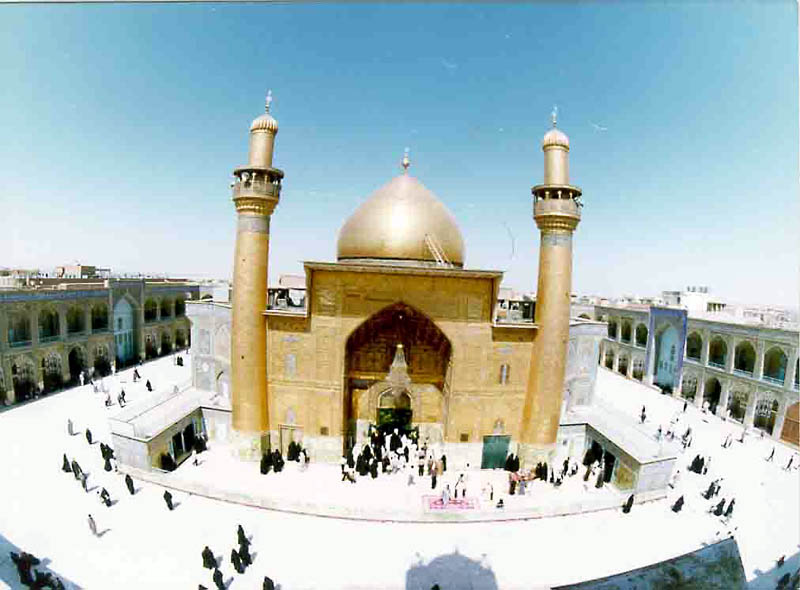
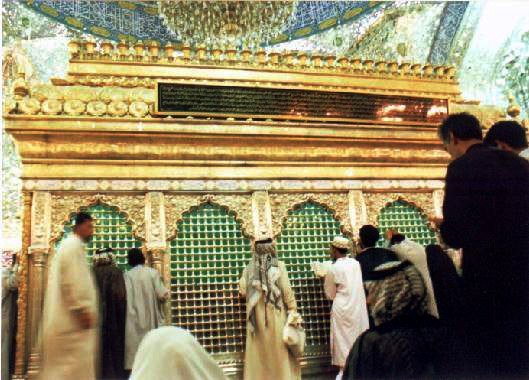
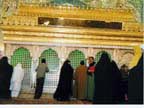
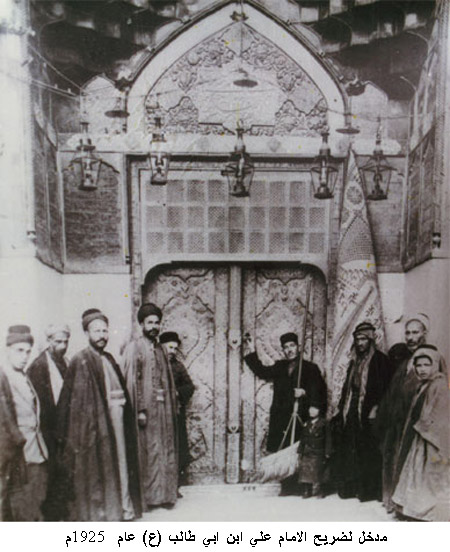
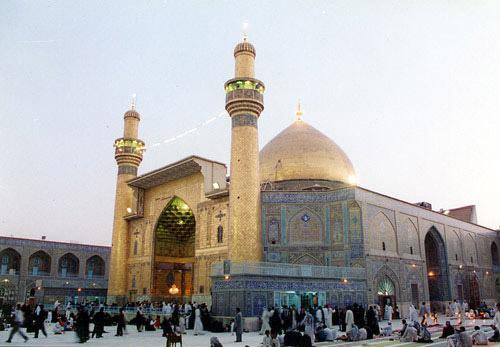
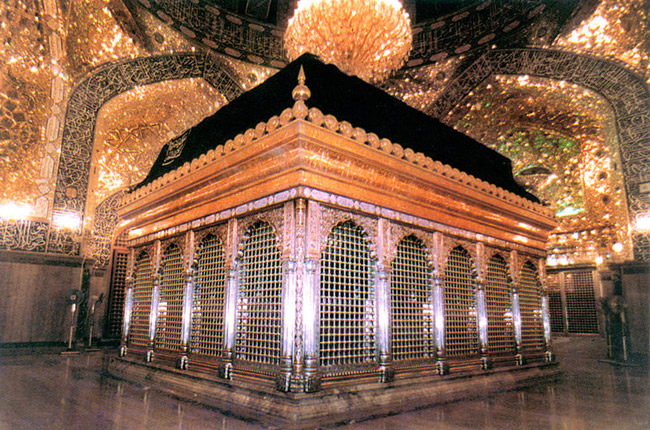
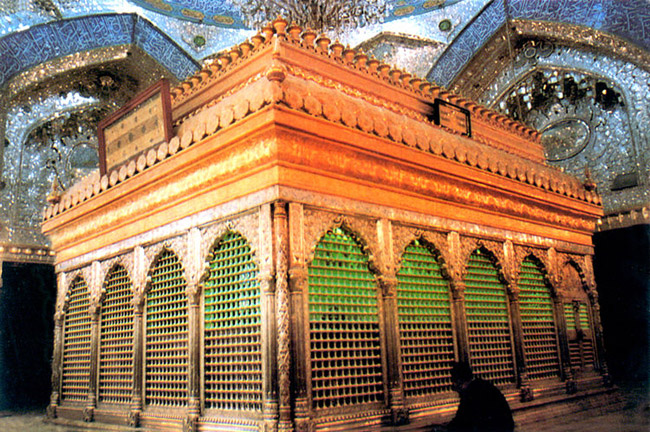
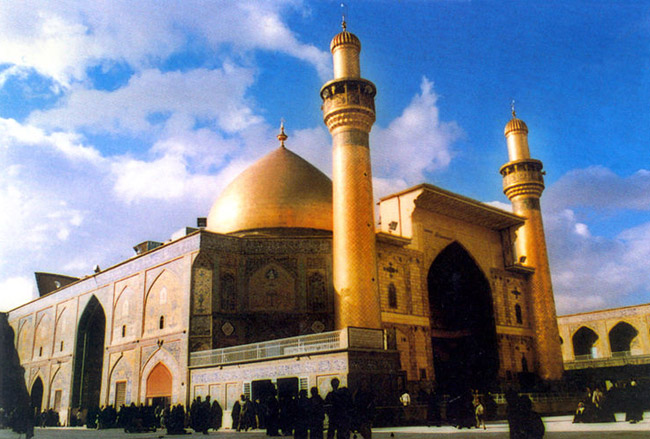
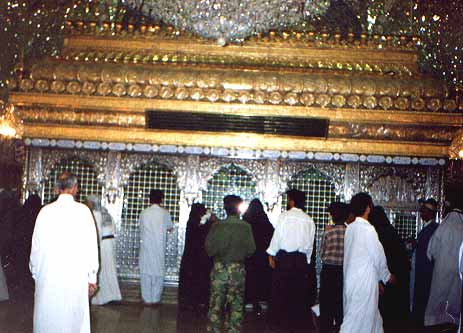
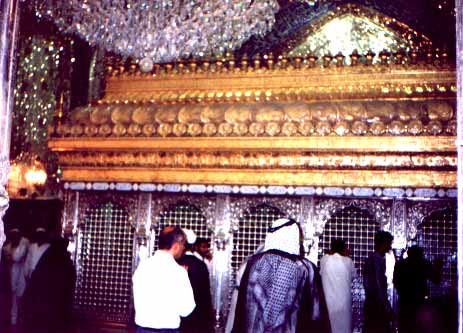
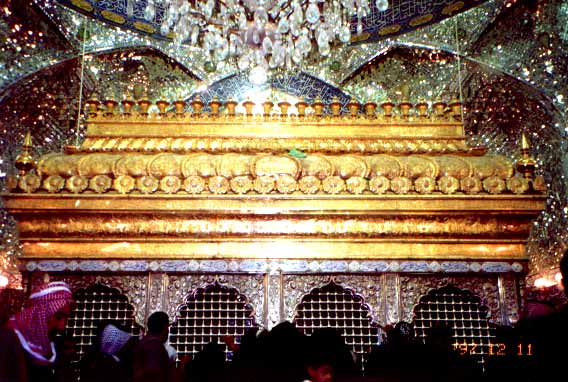
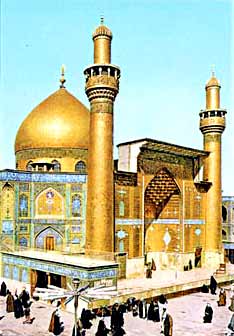
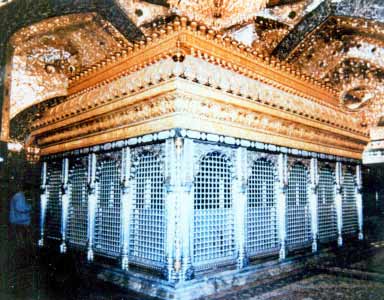
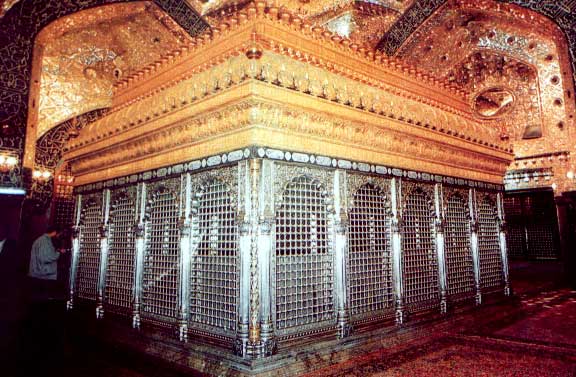
Poem:
He was born in the Ka’ba
The Prophet he saw
He supported him always
Though times were raw.
Though times were raw.
He married Fatima
And had Hassan and Hussain
And Zainab and Umme Kulthum
Who would later all be in pain.
And had Hassan and Hussain
And Zainab and Umme Kulthum
Who would later all be in pain.
He stuck by the Prophet
From the beginning till the end
He became successor
Little did he know that the Prophet had few real friends
They set his house on fire
And killed Fatima’s unborn son
They took away Fadak
The pain of Ali’s family was their fun.
And killed Fatima’s unborn son
They took away Fadak
The pain of Ali’s family was their fun.
Fatima was dead
Nobody knows where
She never forgave the enemies
Who never did care
Nobody knows where
She never forgave the enemies
Who never did care
Ali married another Fatima
Who was called another name
They had Osman, Abdullah, Jafar and Abbas
Who’s relationship with Hussain was like the Prophet and Ali all the same.
Who was called another name
They had Osman, Abdullah, Jafar and Abbas
Who’s relationship with Hussain was like the Prophet and Ali all the same.
Imam stood loyal to Islam no matter
Until he got struck by Ibn Muljim, may Allah curse him
He told Abbas his new master was Hussain
And then he took his last breath; Najaf he is buried in.
Until he got struck by Ibn Muljim, may Allah curse him
He told Abbas his new master was Hussain
And then he took his last breath; Najaf he is buried in.
May Allah curse all oppressors who troubled the Imam (A.S) and his family .
May Allah bring back the Imam Mahdi (A.S) soon.
May Allah bring back the Imam Mahdi (A.S) soon.
Subscribe to:
Posts (Atom)